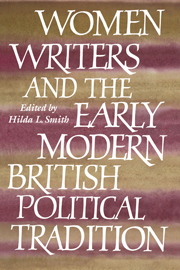Book contents
- Frontmatter
- Contents
- List of contributors
- Preface
- Introduction: Women, intellect, and politics: their intersection in seventeenth-century England
- Part I Women's political writings, 1400–1690
- Part II Women's political and philosophical writings, 1690–1800
- Part III The intellectual context and economic setting for early modern women
- Introduction to Part III
- 9 Contract and coercion: power and gender in Leviathan
- 10 The significant sounds of silence: the absence of women from the political thought of Sir Robert Filmer and John Locke (or, “Why can't a woman be more like a man?”)
- 11 Catharine Macaulay: patriot historian
- 12 Investments, votes, and “bribes”: women as shareholders in the chartered national companies
- Part IV Early modern legal and political prescriptions for women
- Conclusion: women's writing, women's standing: theory and politics in the early modern period
- Index
Introduction to Part III
from Part III - The intellectual context and economic setting for early modern women
Published online by Cambridge University Press: 04 August 2010
- Frontmatter
- Contents
- List of contributors
- Preface
- Introduction: Women, intellect, and politics: their intersection in seventeenth-century England
- Part I Women's political writings, 1400–1690
- Part II Women's political and philosophical writings, 1690–1800
- Part III The intellectual context and economic setting for early modern women
- Introduction to Part III
- 9 Contract and coercion: power and gender in Leviathan
- 10 The significant sounds of silence: the absence of women from the political thought of Sir Robert Filmer and John Locke (or, “Why can't a woman be more like a man?”)
- 11 Catharine Macaulay: patriot historian
- 12 Investments, votes, and “bribes”: women as shareholders in the chartered national companies
- Part IV Early modern legal and political prescriptions for women
- Conclusion: women's writing, women's standing: theory and politics in the early modern period
- Index
Summary
Women as intellectuals, political writers, and simply inhabitants, of early modern Britain lived their lives through frameworks that defined their natures and their interests as distinct from (and inferior to) their male counterparts. This part of the book, while focusing on the writings of individuals including Hobbes, Filmer, Locke, and Catharine Macaulay, treats in greater depth the intellectual and economic structures that restricted, but did not prevent, women's acceptance as public actors and authors. It highlights the power of intellectual values and circles as controlling forces which operated similarly to economic, political, and legal restraints in restricting women's public place and public voice in English society. The questions and assumptions of early modern political thought are assessed not simply for its content but for its force, through inclusion and exclusion of appropriate topics and individuals, in framing the treatment of women politically and as political authors. The authors of this part do not all agree on the nature of such a canon and its influence on women's intellectual and political standing, but they each treat the topic in provocative ways.
Jane Jaquette analyzes the operation of gender assumptions in Hobbes's discussion of the social contract in The Leviathan. In so doing, she offers a more positive interpretation of the use women could make of contract theory than does Carole Pateman in her monograph, The Sexual Contract.
- Type
- Chapter
- Information
- Women Writers and the Early Modern British Political Tradition , pp. 193 - 199Publisher: Cambridge University PressPrint publication year: 1998

